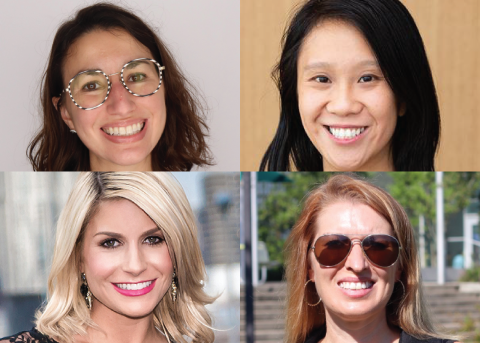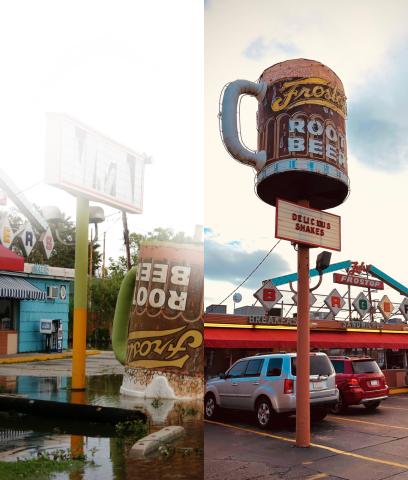Finding Inspiration in the Aftermath: Four Alumnae Share How Hurricane Katrina Shaped Their Lives and Careers

A couple of months after Katrina, Julie Qiu (SLA ’07, *08) and her roommates were given 24 hours to pack a minivan with belongings before the landlord evicted everyone from the apartment building. Some people would take that as a sign to leave for good, but Qiu never considered it.
“Rebuilding my community felt akin to rebuilding myself,” Qiu said. She recalled feeling isolated in the fall of 2005 while attending a university in her hometown of Memphis, Tennessee. But in New Orleans, “I didn’t need to create context for difficult emotions [because] we were all going through it together.”
After graduating with bachelor’s and master’s degrees in English literature, Qiu taught in China and worked in New York City and Delaware. In 2019 she returned to New Orleans, where she said she feels whole. Experiencing Katrina “opened a level of compassion and empathy I wanted to pursue in all parts of my life,” she explained. “I wanted to surround myself with people who cared.” As Newcomb Institute’s program manager for community engagement, Qiu takes inspiration from the ways local neighborhoods looked after residents and led rebuilding efforts after the storm. Trusting community leaders leads to social transformation, she said. “Community engagement empowers . . . people to address their community needs as they know best.”
“Katrina is 100 percent responsible for my career choice,” said Meredith Beers, PhD (PHTM ’11, *16), Tulane University’s associate director for emergency preparedness and response, who initially had planned on becoming a trial attorney. She was an orientation team leader setting up for move-in day when the campus evacuated, and she spent that fall volunteering with Tulane’s administration, which had relocated to Houston near Beers’ family home. She answered phones, made copies and “learned so much that semester about leadership, decision making and how to recover from an unprecedented disaster,” she recalled.
Inspired by that experience, Beers graduated with degrees in English and environmental science and ultimately earned a doctorate focusing on disaster management. In 2018 she joined Tulane’s crisis response team, leading efforts targeting hurricanes and the COVID-19 pandemic. Her current role spans emergency management and crisis communications, and involves building relationships with campus and government partners. “My experiences as a student . . . are foremost in my mind when I develop preparedness plans for the university,” Beers said. “[They] also give me the lens of what my parents experienced, which helps me as I develop materials for parents and when I talk to them before, during and after storms.”
Betsy Lopez (SLA ’10, SW *18) was a high school senior in Jefferson Parish, Louisiana, when Katrina hit, but the experience of weathering the storm with her family — their evacuation was cut short, and for a week they shared a loaf of bread and leftover cookie cake — shaped her years at Tulane. In 2006, accepted into one of the university’s smallest incoming classes, she joined the service-learning program in its first year to rebuild her home region. “I needed to be part of the community, not just take from it,” said Lopez, who was an environmental sciences major.
Following graduation Lopez worked with nonprofits to rebuild local public schools, train advocates to support children and protect vital records. Discovering that all her jobs pointed back to lessening the hardships that accompany disasters, Lopez returned to Tulane for a master’s degree in disaster resilience leadership. Currently she is manager for crisis and grants management with Deloitte & Touche in New Orleans. Her work focuses on hazard mitigation in communities nationwide.
Lopez also shares her expertise and experiences as an adjunct professor in Tulane’s Disaster Resilience Leadership Academy. One key lesson for students: “True disaster resilience requires community engagement, humility and a commitment to listening and learning from those directly affected.” Otherwise, programs may not reach individuals who need support the most, she said.
Lauren Lee Pettiette Schewel (NC ’09) had just set up her firstyear dorm room when suddenly she found herself back home in Shreveport, Louisiana, and then in Virginia for a semester. But amid that upheaval, she understood how fortunate she was. “[My friends and I] were trying to figure out our education while other people were without food, missing family members . . . and drowning and dying. I realized that educational opportunity and stability was a privilege” — and one dependent upon basic needs being met, she said.
That lesson guided Schewel, an English-creative writing major, to law school and a career blending education, advocacy and justice. As director of alumni engagement for HeartShare St. Vincent’s Services, a New York nonprofit supporting children and families, she leads a network for people who have aged out of foster care. The first-of-its-kind initiative cultivates “lifelong belonging, value, well-being, stability and purpose” to help alumni face lingering trauma that may limit their opportunities, she explained. Schewel, who lives in Durham, North Carolina, also is board chair for the LIFE Skills Foundation, a nonprofit assisting youth transitioning into adulthood without family or social support, and is an advocate for people with disabilities.
Now a former member of the Newcomb Alumnae Association Board of Directors, Schewel recalled feeling heavy pressure as a student to help restore New Orleans. However, the experience “encouraged me to find my passion for equity, my joie de vivre and kindness in myself and in others,” she said. “There were so many wrongs that happened in Hurricane Katrina,” Schewel said. “[It] made me realize that I need to speak up.”

